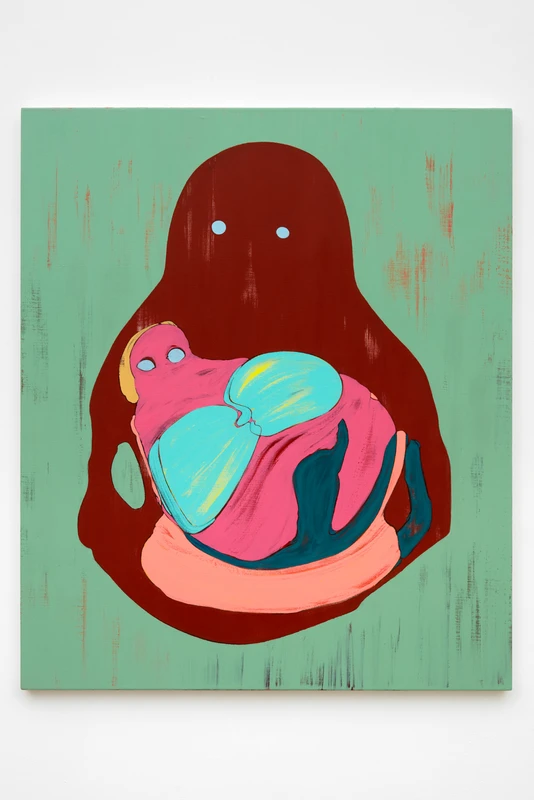Nicola Tyson
1 Oct-18 Dec 2021


I always return to the game of painting, that fundamental conundrum that underpins the endeavour – for me at least – that a painting must justify itself regardless of what it depicts.
– Nicola Tyson, 2021
In her autumn exhibition at Sadie Coles HQ, Nicola Tyson presents nine new paintings alongside three groups of graphite drawings. Reflecting the close dynamic between painting and drawing that has activated her practice from the beginning, Holding Pattern builds on the artist’s acclaimed survey at the Drawing Room in 2017, pushing her use of figuration and portraiture into experimental territory – a place, as she describes, of “pause, a hiccup of laughter, and release.”
In Tyson’s new paintings, intensity of colour – applied in bold segments – is countered by a sense of mutability or suspendedness. Bodies cross into objects and vice versa. Space appears to oscillate between luminous flatness and intimations of depth. Between the Trees captures different organic structures on the point of metamorphosis or interchange: twin tree trunks slice vertically through the composition, framing a more tentative, disjointed stack of anatomic or cellular forms: a floral ‘head’ punctured by a radial eye, a turquoise orb suggesting a torso, two disembodied red hands, and a pair of coloured nuclei.
In Hairpiece, the body resolves – or separates – into a kind of landscape, a brilliantly striated formation that loosely suggests a head with a single recessed eye. Here and throughout her latest paintings, Tyson depicts figures or creatures that appear suspended between material and psychological states, as well as being freed from the constraints of ‘narrative’ or the structuring patterns of ‘iconography’. She has stated that her images “never lift off completely – or slide into narrative – even though something is clearly happening. Instead, they stay locked within the claustrophobic loop (Holding Pattern) of the painting’s internal logic.”
The dual elasticity and intensity of Tyson’s imagery suggests an interior state as much as a physical one, conveying the idea of ‘embodied experience’ – that is, experience relative to the individual body. Through a combination of hard-edged colour and ambivalent form, she evokes the interplay of perception, thought and feeling that characterises such experience. In Pencil, a female figure rendered out of amorphous planes of colour grasps a staff-like pencil in one of her magenta hands, wielding the drawing implement like a weapon. The painting teeters on the edge of the cartoonish – the figure’s pink head is featureless apart from the turquoise apertures of its eyes – and yet retains an air of radical open-endedness, accentuated by the flimsy blank sheets that hang in the background.
Tyson’s art draws upon, and grapples with, that of artistic forbears as diverse as Maria Lassnig, Hans Bellmer and Pablo Picasso. (Her 2013 book Dead Letter Men verbalises this mode of combative engagement, in a series of missives to deceased male artists). Her practice has its roots in a 1990s moment when, as she has recalled, painting was considered “at best conservative and probably redundant,” and yet she continues to assert the vitality of her medium from a contrary feminist mindset. “Art is a collaboration of sorts,” she has proposed. “It assumes you understand some of the rules – and that they can change – but that you, the viewer, will fill in the necessary blanks and complete the work, do half the work.”
In three series of graphite drawings, Tyson tests and revisits the concerns of her paintings – those of psychology and anatomy, surface and depth, fixity and metamorphosis – at a condensed scale. Poised between lyricism and a sense of the visceral, her exactingly-toned compositions span the emotive and gestural range of her practice, as critic Mark Harris has observed: “Tyson’s work arrives at a baleful imaginary that oscillates between the recognizable and an assortment of peculiar contours and tonalities that rebel at their referential function.”
Nicola Tyson (b. 1960, London), has exhibited internationally. Recent solo exhibitions include Four Paintings, Sadie Coles HQ (2020); Beyond a Trace, The Drawing Room, London (2017); A Tendency to Flock, Sadie Coles HQ, London (2017); Paintings and Works on Paper, Contemporary Art Museum, St. Louis, MO (2017); Works on Paper, Petzel Gallery, New York (2016); and GOODBYE/HELLO, Galerie Nathalie Obadia, Paris (2015). Her 2012 exhibition Bowie Nights at Billy's Club, London, 1978, White Columns, New York (which travelled to Sadie Coles HQ, London in 2013), comprised an archive of compelling and evocative photographs documenting the London club scene of the late 1970s. Recent group exhibitions include 100 Drawings from Now, The Drawing Center, New York (2020); ISelf Collection: Bumped Bodies, Whitechapel Gallery, London (2018); Drawing Room Biennial 2017, The Drawing Room, London (2017); Artistic Differences, ICA, London (2016) and Receipt of a Magical Agent, Center for Curatorial Studies, Bard College, Annandale-on-Hudson (2016). Her work is held in various prestigious public collections internationally including the Museum of Modern Art, New York, Metropolitan Museum, New York, Walker Art Center, Minneapolis, San Francisco Museum of Modern Art, Corcoran Gallery of Art, Washington D.C, and Tate Modern, London.
61713769105df.pdf
Download